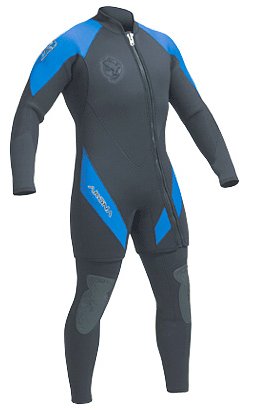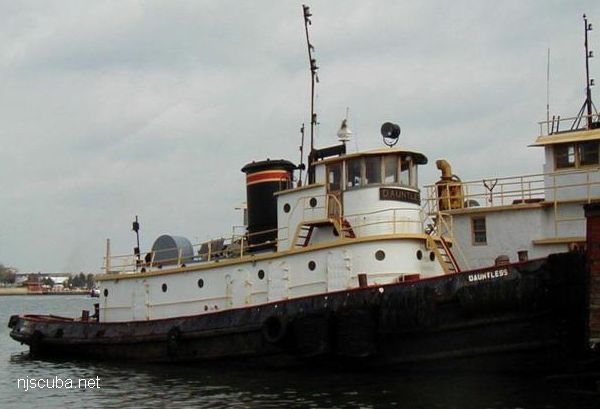Exposure Suits - Wetsuits

The minimum exposure protection you should plan on for New Jersey diving is a full 6 or 7 mm neoprene wetsuit, with equivalent hood, gloves, and boots. A common misconception about wetsuits is that the water inside keeps you warm. This is absolutely false - the less cold water that gets in, the warmer you will be. ( Some folks actually bring jugs of hot water and pour it into their wetsuits just before the dive. ) Once the suit floods and the water inside warms up, you do feel better, but that water got warmer because you got colder. The trick is to keep as much as possible of this warmed water inside the suit, but almost every motion you make will pump out some warm water, and bring in more cold.
Two things will reduce this pumping tendency. The first thing is a properly sized and fitted suit. A wetsuit should be snug, without crushing you, and there should be no large empty spaces inside when you put it on. Many people have a hard time finding a wetsuit that fits just right. The second thing is a well-made suit. Features of a superior wetsuit include:
- gusseted main zippers with interior flaps to reduce leakage
- ankle and wrist zippers for ease of donning and good fit
- skin-in seals at the wrists, ankles, and possibly the neck to reduce leakage
- tightly assembled seams that will not open up and leak over time
- durable kneepads to avoid cuts and abrasions in this high-wear area
Lately, a number of manufacturers have come out with wetsuits that are almost entirely "skin-in" material inside, something which is supposed to radically reduce water flushing. I can't say if it works or not, but it makes sense. Unfortunately, at the same time the two-piece farmer john style wetsuit seems to have gone out of fashion in favor of one-piece designs that are inherently thinner.
Expect to pay around $300 for a good cold-water wetsuit. Also, be aware that neoprene wetsuits wear out in as little as 3-5 years depending on use, and an old wetsuit is not as warm or watertight as a new one. Therefore, a used wetsuit is probably not a good deal at any price, especially if it has been heavily used in chlorinated pool water like most rentals. Wetsuits also shrink. As the air leaks out of the tiny bubbles in the material, it contracts, and after a couple of years, it probably won't fit anymore, even if you didn't get fatter!
A neoprene wetsuit insulates you by virtue of those tiny air bubbles in the rubber, which are what give the neoprene its insulating value. A problem with all wetsuits is that the deeper you go, the more these tiny bubbles compress, and the less insulating value the suit will have. This is especially unfortunate since the deeper you go, the colder it gets, and the suit basically fails you when you need it most. Another problem with thick neoprene wetsuits is their buoyancy varies from almost 20 pounds at the surface to near nil at depth. In order to compensate for this, you need a lot of lead weight at the surface to get down, and then a Buoyancy Compensating Device ( a "BC" or "BCD" ) to support all that lead at depth.
A lot of manufacturers nowadays are making a lot of hype over the advanced materials they use in their wetsuits. They often charge considerable premiums for features that are of little or no value, such as the inclusion of titanium in the neoprene. ( In theory, flecks of titanium would reduce radiative heat loss. Trouble is, with a temperature difference of perhaps 40°F between the inside and outside of the suit, radiative heat loss is practically nil anyway. ) A good wetsuit as described above will keep you as warm as a wetsuit is going to keep you, without costing a fortune. To get warmer than that, you will need a drysuit.
There are also more and more semi-dry suits coming on the market nowadays. These are basically wetsuits with enhanced seals that limit flooding and water exchange during a dive. This is probably a great idea for the tropics, but I don't think much of it for local use - for the extra cost, get a real drysuit instead.
Rinse your wetsuit well inside and out after every day of diving, unless you want it to really stink. Henderson, right here in Millville NJ, makes excellent wetsuits that are widely available at good prices.

